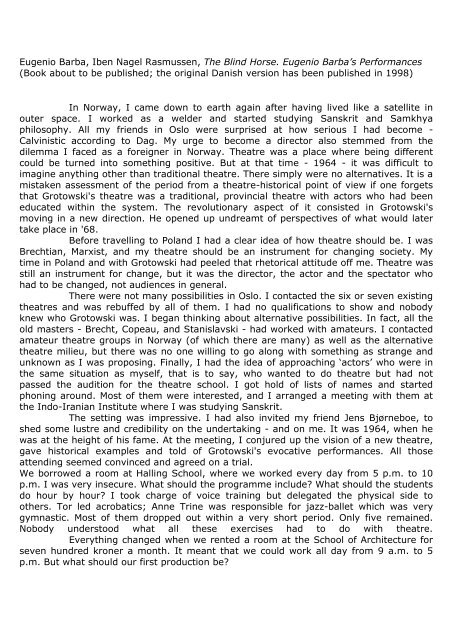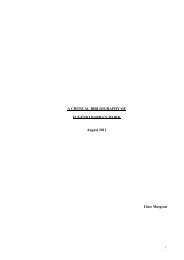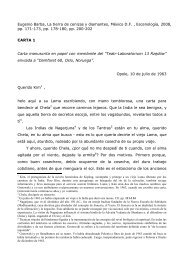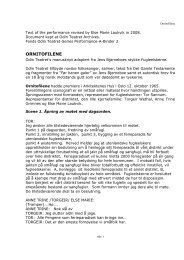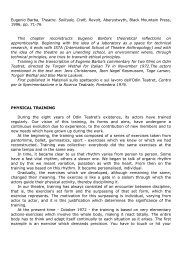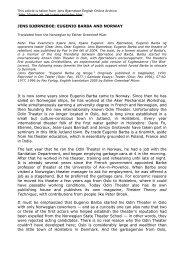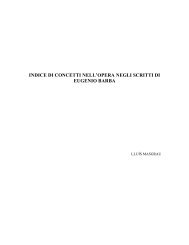Eugenio Barba, Iben Nagel Rasmussen, The Blind Horse. Eugenio ...
Eugenio Barba, Iben Nagel Rasmussen, The Blind Horse. Eugenio ...
Eugenio Barba, Iben Nagel Rasmussen, The Blind Horse. Eugenio ...
You also want an ePaper? Increase the reach of your titles
YUMPU automatically turns print PDFs into web optimized ePapers that Google loves.
<strong>Eugenio</strong> <strong>Barba</strong>, <strong>Iben</strong> <strong>Nagel</strong> <strong>Rasmussen</strong>, <strong>The</strong> <strong>Blind</strong> <strong>Horse</strong>. <strong>Eugenio</strong> <strong>Barba</strong>’s Performances<br />
(Book about to be published; the original Danish version has been published in 1998)<br />
In Norway, I came down to earth again after having lived like a satellite in<br />
outer space. I worked as a welder and started studying Sanskrit and Samkhya<br />
philosophy. All my friends in Oslo were surprised at how serious I had become -<br />
Calvinistic according to Dag. My urge to become a director also stemmed from the<br />
dilemma I faced as a foreigner in Norway. <strong>The</strong>atre was a place where being different<br />
could be turned into something positive. But at that time - 1964 - it was difficult to<br />
imagine anything other than traditional theatre. <strong>The</strong>re simply were no alternatives. It is a<br />
mistaken assessment of the period from a theatre-historical point of view if one forgets<br />
that Grotowski's theatre was a traditional, provincial theatre with actors who had been<br />
educated within the system. <strong>The</strong> revolutionary aspect of it consisted in Grotowski's<br />
moving in a new direction. He opened up undreamt of perspectives of what would later<br />
take place in '68.<br />
Before travelling to Poland I had a clear idea of how theatre should be. I was<br />
Brechtian, Marxist, and my theatre should be an instrument for changing society. My<br />
time in Poland and with Grotowski had peeled that rhetorical attitude off me. <strong>The</strong>atre was<br />
still an instrument for change, but it was the director, the actor and the spectator who<br />
had to be changed, not audiences in general.<br />
<strong>The</strong>re were not many possibilities in Oslo. I contacted the six or seven existing<br />
theatres and was rebuffed by all of them. I had no qualifications to show and nobody<br />
knew who Grotowski was. I began thinking about alternative possibilities. In fact, all the<br />
old masters - Brecht, Copeau, and Stanislavski - had worked with amateurs. I contacted<br />
amateur theatre groups in Norway (of which there are many) as well as the alternative<br />
theatre milieu, but there was no one willing to go along with something as strange and<br />
unknown as I was proposing. Finally, I had the idea of approaching ‘actors’ who were in<br />
the same situation as myself, that is to say, who wanted to do theatre but had not<br />
passed the audition for the theatre school. I got hold of lists of names and started<br />
phoning around. Most of them were interested, and I arranged a meeting with them at<br />
the Indo-Iranian Institute where I was studying Sanskrit.<br />
<strong>The</strong> setting was impressive. I had also invited my friend Jens Bjørneboe, to<br />
shed some lustre and credibility on the undertaking - and on me. It was 1964, when he<br />
was at the height of his fame. At the meeting, I conjured up the vision of a new theatre,<br />
gave historical examples and told of Grotowski's evocative performances. All those<br />
attending seemed convinced and agreed on a trial.<br />
We borrowed a room at Halling School, where we worked every day from 5 p.m. to 10<br />
p.m. I was very insecure. What should the programme include? What should the students<br />
do hour by hour? I took charge of voice training but delegated the physical side to<br />
others. Tor led acrobatics; Anne Trine was responsible for jazz-ballet which was very<br />
gymnastic. Most of them dropped out within a very short period. Only five remained.<br />
Nobody understood what all these exercises had to do with theatre.<br />
Everything changed when we rented a room at the School of Architecture for<br />
seven hundred kroner a month. It meant that we could work all day from 9 a.m. to 5<br />
p.m. But what should our first production be?
Lovers.<br />
I spoke to Bjørneboe about using a piece he had just finished writing: <strong>The</strong> Bird


